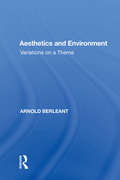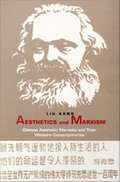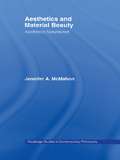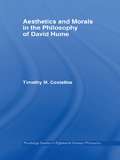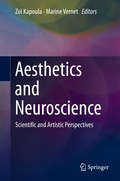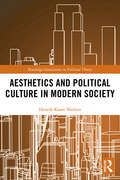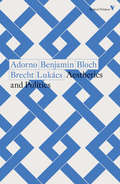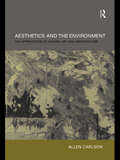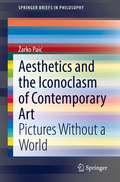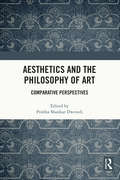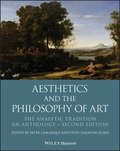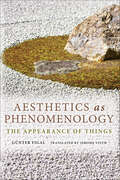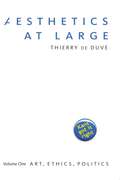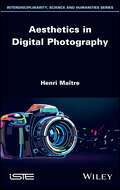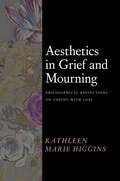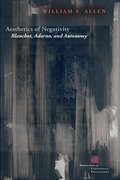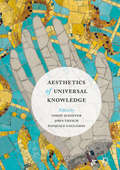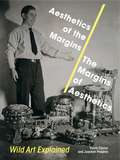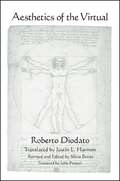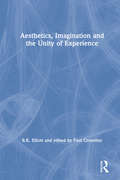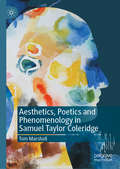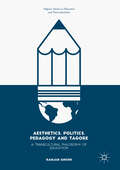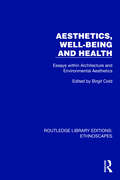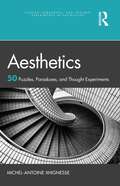- Table View
- List View
Aesthetics and Environment: Variations on a Theme
by Arnold BerleantThe essays collected in Aesthetics and Environment comprise a set of variations on art and culture guided by the theme of environment. The essays deal with the physical reality of environment such as the city, the shore, the water and the garden, but also with the virtual environment and the social one. Environmental aesthetics is a theme whose variations are as endless as the possibilities of the human performers and conditions from which it is fashioned. This enticing set of essays testifies to Berleant's special talent in moving easily between both natural and human environments and opens out the contemporary discussion beyond that of the wilderness to the cultural and social environment. Berleant argues that neither the natural nor human environment stands alone and both are best understood as distinctions that are in experience coextensive, that one can only speak of environment in relation to human experience. The theme of this book is that such experience suffuses the so-called natural world and shapes the human world. It maintains the idea that in as much as people are embedded in these worlds, relationships, including human relationships, are part of them. The melding of these two worlds leads Berleant to defend ultimately what he has termed 'social aesthetics' .
Aesthetics and Marxism: Chinese Aesthetic Marxists and Their Western Contemporaries
by Liu KangAlthough Chinese Marxism--primarily represented by Maoism--is generally seen by Western intellectuals as monolithic, Liu Kang argues that its practices and projects are as diverse as those in Western Marxism, particularly in the area of aesthetics. In this comparative study of European and Chinese Marxist traditions, Liu reveals the extent to which Chinese Marxists incorporate ideas about aesthetics and culture in their theories and practices. In doing so, he constructs a wholly new understanding of Chinese Marxism. Far from being secondary considerations in Chinese Marxism, aesthetics and culture are in fact principal concerns. In this respect, such Marxists are similar to their Western counterparts, although Europeans have had little understanding of the Chinese experience. Liu traces the genealogy of aesthetic discourse in both modern China and the West since the era of classical German thought, showing where conceptual modifications and divergences have occurred in the two traditions. He examines the work of Mao Zedong, Lu Xun, Li Zehou, Qu Qiubai, and others in China, and from the West he discusses Kant, Schiller, Schopenhauer, and Marxist theorists including Horkheimer, Adorno, Benjamin, and Marcuse. While stressing the diversity of Marxist positions within China as well as in the West, Liu explains how ideas of culture and aesthetics have offered a constructive vision for a postrevolutionary society and have affected a wide field of issues involving the problems of modernity. Forcefully argued and theoretically sophisticated, this book will appeal to students and scholars of contemporary Marxism, cultural studies, aesthetics, and modern Chinese culture, politics, and ideology.
Aesthetics and Material Beauty: Aesthetics Naturalized (Routledge Studies in Contemporary Philosophy)
by Jennifer A. McMahonIn Aesthetics and Material Beauty, Jennifer A. McMahon develops a new aesthetic theory she terms Critical Aesthetic Realism - taking Kantian aesthetics as a starting point and drawing upon contemporary theories of mind from philosophy, psychology, and cognitive science. The creative process does not proceed by a set of rules. Yet the fact that its objects can be understood or appreciated by others suggests that the creative process is constrained by principles to which others have access. According to her update of Kantian aesthetics, beauty is grounded in indeterminate yet systematic principles of perception and cognition. However, Kant’s aesthetic theory rested on a notion of indeterminacy whose consequences for understanding the nature of art were implausible. McMahon conceptualizes "indeterminacy" in terms of contemporary philosophical, psychological, and computational theories of mind. In doing so, she develops an aesthetic theory that reconciles the apparent dichotomies which stem from the tension between the determinacy of communication and the indeterminacy of creativity. Dichotomies such as universality and subjectivity, objectivity and autonomy, cognitivism and non-cognitivism, and truth and beauty are revealed as complementary features of an aesthetic judgment.
Aesthetics and Morals in the Philosophy of David Hume (Routledge Studies in Eighteenth-Century Philosophy)
by Timothy M CostelloeThe book has two aims. First, to examine the extent and significance of the connection between Hume's aesthetics and his moral philosophy; and, second, to consider how, in light of the connection, his moral philosophy answers central questions in ethics. The first aim is realized in chapters 1-4. Chapter 1 examines Hume's essay "Of the Standard of Taste" to understand his search for a "standard" and how this affects the scope of his aesthetics. Chapter 2 establishes that he treats beauty in nature and art and moral beauty as similar in kind, and applies the conclusions about his aesthetics to his moral thought. Chapter 3 solves a puzzle to which this gives rise, namely, how individuals both accept general standards that they also contravene in the course of aesthetic and moral activity. Chapter 4 takes up the normative aspect of Hume's approach by understanding moral character through his view of moral beauty. The second aim of the book is realized in chapters 5-7 by entertaining three objections against Hume's moral philosophy. First, if morality is an immediate reaction to the beauty of vice and the deformity of virtue, why is perfect virtue not the general condition of every human individual? Second, if morality consists of sentiments that arise in the subject, how can moral judgments be objective and claim universal validity? And third, if one can talk of "general standards" governing conduct, how does one account for the diversity of moral systems and their change over time? The first is answered by showing that like good taste in aesthetics, 'right taste' in morals requires that the sentiments are educated; the second, by arguing against the view that Hume is a subjectivist and a relativist, and the third (chapter 6), by showing that his approach contains a view of progress left untouched by any personal prejudices Hume himself might harbor. The book concludes in chapter 7 by showing how Hume's view of philosophy affects the scope of any normative ethics.
Aesthetics and Neuroscience: Scientific and Artistic Perspectives
by Zoï Kapoula Marine VernetThis edited monograph provides a compelling analysis of the interplay between neuroscience and aesthetics. The book broaches a wide spectrum of topics including, but not limited to, mathematics and creator algorithms, neurosciences of artistic creativity, paintings and dynamical systems as well as computational research for architecture. The international authorship is genuinely interdisciplinary and the target audience primarily comprises readers interested in transdisciplinary research between neuroscience and the broad field of aesthetics.
Aesthetics and Political Culture in Modern Society (Routledge Innovations in Political Theory)
by Henrik Kaare NielsenDo aesthetic appeals to senses and emotions in political debate necessarily marginalise political reason and reduce citizens to consumers – thus dangerously undermining democracy? Or is sensuous-emotional engagement, on the contrary, a basic fact of the political process and a crucial precondition for revitalising democracy? Aesthetics and Political Culture in Modern Society investigates the current interrelationship between aesthetic practice and political practice in Western democracies, focusing on its impact on democratic political culture. Henrik Kaare Nielsen argues that aesthetic interventions in the political process do not by definition undermine politics’ content of reason. Instead, a differentiation must be made between a multiplicity of aesthetic forms of intervention – some of which tend to weaken the political judgement of citizens while other forms tend to stimulate competent judgement. This book will be of interest to scholars in the fields of political science, sociology, media studies, and cultural studies.
Aesthetics and Politics (Radical Thinkers)
by Walter Benjamin Theodor Adorno Georg Lukacs Bertolt Brecht Ernst BlochNo other country and no other period has produced a tradition of major aesthetic debate to compare with that which unfolded in German culture from the 1930s to the 1950s. In Aesthetics and Politics the key texts of the great Marxist controversies over literature and art during these years are assembled in a single volume. They do not form a disparate collection but a continuous, interlinked debate between thinkers who have become giants of twentieth-century intellectual history.
Aesthetics and the Environment: The Appreciation of Nature, Art and Architecture
by Allen CarlsonTraditional aesthetics is often associated with the appreciation of art, Allen Carlson shows how much of our aesthetic experience does not encompass art but nature, in our response to sunsets, mountains or horizons or more mundane surroundings, like gardens or the view from our window.He argues that knowledge of what it is we are appreciating is essential to having an appropriate aesthetic experience and that scientific understanding of nature can enhance our appreciation of it, rather than denigrate it.
Aesthetics and the Iconoclasm of Contemporary Art: Pictures Without a World (SpringerBriefs in Philosophy)
by Žarko PaićThe main themes and aims of this book are understanding aesthetics, contemporary art and the end of the avant-garde not from the traditional viewpoint of the metaphysics of the beautiful and the sublime but rather thru close connection to the techno-genesis of virtual worlds. This book tackles problems in contemporary art theory such as the body in space and time of digital technologies, along with other issues in visual studies and image science. Further intentions exhibit the fundamental reasons for the disappearance of the picture in the era of virtual reality starting from the notion of contemporary art as realized iconoclasm; art has no world for its "image". The author argues that the iconoclasm of contemporary art has severe consequences. This text appeals to philosophers of art and those interested in contemporary art theory.
Aesthetics and the Philosophy of Art: Comparative Perspectives
by Prabha Shankar DwivediThis volume brings together the finest research on aesthetics and the philosophy of art by stalwart critics and leading scholars in the field. It discusses various themes, such as the idea of aesthetic perception, the nature of aesthetic experience, attitude theory, the relation of art to morality, representation in art, and the association of aesthetics with language studies in the Indian tradition. It deliberates over the theories and views of Aristotle, Freud, Plato, Immanuel Kant, T. S. Eliot, George Dickie, Leo Tolstoy, R. G. Collingwood, Michael H. Mitias, Monroe C. Beardsley, and Abhinavagupta, among others. The book offers a comparative perspective on Indian and Western approaches to the study of art and aesthetics and enables readers to appreciate the similarities and differences between the conceptions of aesthetics and philosophy of art on a comparative scale detailing various aspects of both. The first of its kind, this key text will be useful for scholars and researchers of arts and aesthetics, philosophy of art, cultural studies, comparative literature, and philosophy in general. It will also appeal to general readers interested in the philosophy of art.
Aesthetics and the Philosophy of Art: The Analytic Tradition, An Anthology (Blackwell Philosophy Anthologies)
by Peter Lamarque Stein Haugom OlsenFor over fifty years, philosophers working within the broader remit of analytic philosophy have developed and refined a substantial body of work in aesthetics and the philosophy of art, curating a core foundation of scholarship which offers rigor and clarity on matters of profound and perennial interest relating to art and all forms of aesthetic appreciation. Now in its second edition and thoroughly revised, Aesthetics and the Philosophy of Art—The Analytic Tradition: An Anthology captures this legacy in a comprehensive introduction to the core philosophical questions and conversations in aesthetics. Through 57 key essays selected by leading scholars Peter Lamarque and Stein Haugom Olsen, this anthology collects modern classics as well as new contributions on essential topics such as the identification and ontology of art, interpretation, values of art, art and knowledge, and fiction and the imagination. New to this edition are selections which treat aesthetic experience more widely, including essays on the aesthetics of nature and aesthetics in everyday life. Other carefully-chosen pieces analyze the practice and experience of specific art forms in greater detail, including painting, photography, film, literature, music, and popular art such as comics. This bestselling collection is an essential resource for students and scholars of aesthetics, designed to foster a foundational understanding of both long-standing and contemporary topics in the field.
Aesthetics as Phenomenology: The Appearance of Things (Studies in Continental Thought)
by Günter FigalConnecting aesthetic experience with our experience of nature or with other cultural artifacts, Aesthetics as Phenomenology focuses on what art means for cognition, recognition, and affect—how art changes our everyday disposition or behavior. Günter Figal engages in a penetrating analysis of the moment at which, in our contemplation of a work of art, reaction and thought confront each other. For those trained in the visual arts and for more casual viewers, Figal unmasks art as a decentering experience that opens further possibilities for understanding our lives and our world.
Aesthetics at Large: Volume 1: Art, Ethics, Politics (Art, Ethics, Politics)
by Thierry de DuveImmanuel Kant’s Critique of Judgment, Thierry de Duve argues in the first volume of Aesthetics at Large, is as relevant to the appreciation of art today as it was to the enjoyment of beautiful nature in 1790. Going against the grain of all aesthetic theories situated in the Hegelian tradition, this provocative thesis, which already guided de Duve’s groundbreaking book Kant After Duchamp (1996), is here pursued in order to demonstrate that far from confining aesthetics to a stifling formalism isolated from all worldly concerns, Kant’s guidance urgently opens the understanding of art onto ethics and politics. Central to de Duve’s re-reading of the Critique of Judgment is Kant’s idea of sensus communis, ultimately interpreted as the mere yet necessary idea that human beings are capable of living in peace with one another. De Duve pushes Kant’s skepticism to its limits by submitting the idea of sensus communis to various tests leading to questions such as: Do artists speak on behalf of all of us? Is art the transcendental ground of democracy? Or, Was Adorno right when he claimed that no poetry could be written after Auschwitz? Loaded with de Duve’s trademark blend of wit and erudition and written without jargon, these essays radically renew current approaches to some of the most burning issues raised by modern and contemporary art. They are indispensable reading for anyone with a deep interest in art, art history, or philosophical aesthetics.
Aesthetics in Digital Photography
by Henri MaîtreAutomatically evaluating the aesthetic qualities of a photograph is a current challenge for artificial intelligence technologies, yet it is also an opportunity to open up new economic and social possibilities.Aesthetics in Digital Photography presents theories developed over the last 25 centuries by philosophers and art critics, who have sometimes been governed by the objectivity of perception, and other times, of course, by the subjectivity of human judgement. It explores the advances that have been made in neuro-aesthetics and their current limitations.In the field of photography, this book puts aesthetic hypotheses up against experimental verification, and then critically examines attempts to “scientifically” measure this beauty. Special attention is paid to artificial intelligence techniques, taking advantage of machine learning methods and large databases.
Aesthetics in Grief and Mourning: Philosophical Reflections on Coping with Loss
by Kathleen Marie HigginsA philosophical exploration of aesthetic experience during bereavement. In Aesthetics of Grief and Mourning, philosopher Kathleen Marie Higgins reflects on the ways that aesthetics aids people experiencing loss. Some practices related to bereavement, such as funerals, are scripted, but many others are recursive, improvisational, mundane—telling stories, listening to music, and reflecting on art or literature. Higgins shows how these grounding, aesthetic practices can ease the disorienting effects of loss, shedding new light on the importance of aesthetics for personal and communal flourishing.
Aesthetics of Negativity: Blanchot, Adorno, and Autonomy (Perspectives in Continental Philosophy)
by William S. AllenMaurice Blanchot and Theodor W. Adorno are among the most difficult but also the most profound thinkers in twentieth-century aesthetics. While their methods and perspectives differ widely, they share a concern with the negativity of the artwork conceived in terms of either its experience and possibility or its critical expression. Such negativity is neither nihilistic nor pessimistic but concerns the status of the artwork and its autonomy in relation to its context or its experience. For both Blanchot and Adorno negativity is the key to understanding the status of the artwork in post-Kantian aesthetics and, although it indicates how art expresses critical possibilities, albeit negatively, it also shows that art bears an irreducible ambiguity such that its meaning can always negate itself. This ambiguity takes on an added material significance when considered in relation to language as the negativity of the work becomes aesthetic in the further sense of being both sensible and experimental, and in doing so the language of the literary work becomes a form of thinking that enables materiality to be thought in its ambiguity.In a series of rich and compelling readings, William S. Allen shows how an original and rigorous mode of thinking arises within Blanchot’s early writings and how Adorno’s aesthetics depends on a relation between language and materiality that has been widely overlooked. Furthermore, by reconsidering the problem of the autonomous work of art in terms of literature, a central issue in modernist aesthetics is given a greater critical and material relevance as a mode of thinking that is abstract and concrete, rigorous and ambiguous. While examples of this kind of writing can be found in the works of Blanchot and Beckett, the demands that such texts place on readers only confirm the challenges and the possibilities that literary autonomy poses to thought.
Aesthetics of Universal Knowledge
by Simon Schaffer John Tresch Pasquale GagliardiThis volume presents innovative and provocative arguments about the claims of universal knowledge schemes and the different aesthetic and material forms in which such claims have been made and executed. Contributors take a close look at everything from religious pilgrimages, museums, and maps of the world, to search engines and automated GPS. This collection of essays and debates is the result of a major international dialogue held at the Fondazione Giorgio Cini in Venice, Italy. Current obsessions in information technology, communications theory, and digital culture often concern the value and possibility of a grand accumulation of universally accessible forms of knowledge: total libraries, open data bases, ubiquitous computing, and 'smart' technologies. These obsessions have important social and philosophical origins, and they raise profound questions about the very nature of knowledge and its organization. This volume's contributors draw on the histories of maps and of encyclopedias, worldviews and visionary collections, to make sense of the crucial relation between the way the world is known and how it might be displayed and transformed.
Aesthetics of the Margins / The Margins of Aesthetics: Wild Art Explained
by David Carrier Joachim Pissarro"Wild Art" refers to work that exists outside the established, rarified world of art galleries and cultural channels. It encompasses uncatalogued, uncommodified art not often recognized as such, from graffiti to performance, self-adornment, and beyond. Picking up from their breakthrough book on the subject, Wild Art, David Carrier and Joachim Pissarro here delve into the ideas driving these forms of art, inquire how it came to be marginalized, and advocate for a definition of "taste," one in which each expression is acknowledged as being different while deserving equal merit.Arguing that both the "art world" and "wild art" have the same capacity to produce aesthetic joy, Carrier and Pissarro contend that watching skateboarders perform Christ Air, for example, produces the same sublime experience in one audience that another enjoys while taking in a ballet; therefore, both mediums deserve careful reconsideration. In making their case, the two provide a history of the institutionalization of "taste" in Western thought, point to missed opportunities for its democratization in the past, and demonstrate how the recognition and acceptance of "wild art" in the present will radically transform our understanding of contemporary visual art in the future.Provocative and optimistic, Aesthetics of the Margins / The Margins of Aesthetics rejects the concept of "kitsch" and the high/low art binary, ultimately challenging the art world to become a larger and more inclusive place.
Aesthetics of the Margins / The Margins of Aesthetics: Wild Art Explained
by David Carrier Joachim Pissarro“Wild Art” refers to work that exists outside the established, rarified world of art galleries and cultural channels. It encompasses uncatalogued, uncommodified art not often recognized as such, from graffiti to performance, self-adornment, and beyond. Picking up from their breakthrough book on the subject, Wild Art, David Carrier and Joachim Pissarro here delve into the ideas driving these forms of art, inquire how it came to be marginalized, and advocate for a definition of “taste,” one in which each expression is acknowledged as being different while deserving equal merit.Arguing that both the “art world” and “wild art” have the same capacity to produce aesthetic joy, Carrier and Pissarro contend that watching skateboarders perform Christ Air, for example, produces the same sublime experience in one audience that another enjoys while taking in a ballet; therefore, both mediums deserve careful reconsideration. In making their case, the two provide a history of the institutionalization of “taste” in Western thought, point to missed opportunities for its democratization in the past, and demonstrate how the recognition and acceptance of “wild art” in the present will radically transform our understanding of contemporary visual art in the future.Provocative and optimistic, Aesthetics of the Margins / The Margins of Aesthetics rejects the concept of “kitsch” and the high/low art binary, ultimately challenging the art world to become a larger and more inclusive place.
Aesthetics of the Virtual (SUNY series in Contemporary Italian Philosophy)
by Roberto DiodatoArguing that the virtual body is something new—namely, an entity that from an ontological perspective has only recently entered the world—Roberto Diodato considers the implications of this kind of body for aesthetics. Virtual bodies insert themselves into the space opened up by the famous distinction in Aristotle's Physics between natural and artificial beings—they are both. They are beings that are simultaneously events; they are images that are at once internal and external; they are ontological hybrids that exist only in the interaction between logical-computational text and human bodies endowed with technological prostheses. Pursuing this line of thought, Diodato reconfigures classic aesthetic concepts such as mimesis, representation, the relation between illusion and reality, the nature of images and imagination, and the theory of sensory knowledge.
Aesthetics, Imagination and the Unity of Experience
by R.K. Elliott edited by CrowtherThis is the first book to gather together R. K. Elliott's important essays on aesthetics. These essays put forward a number of common themes that together constitute a unified approach to aesthetics. A theory of imagination is developed and ideas concerning the practice of art criticism are explored before the relevance of aesthetics for ethics is discussed. Throughout his writing Elliott combines analytic rigour with sympathy for ideas in continental philosophy. He values subjectivity but his analytic stance prevents this from falling into mere personal opinion; he is also able to show how art and aesthetic theory is of complex relevance to broader areas of experience such as education, freedom, and moral action. In the course of his discussion Elliott offers an in-depth analysis of Kant's Critique of Judgement, Clive Bell's aesthetic theory, and the relevance of Wittgenstein for aesthetics. Study of Elliott's essays presented in this book powerfully illuminates the unifying role of imagination and the aesthetic in human experience.
Aesthetics, Poetics and Phenomenology in Samuel Taylor Coleridge
by Tom MarshallThis book re-evaluates the philosophical status of Samuel Taylor Coleridge by providing an extended comparison between his work and the phenomenological theory of Edmund Husserl. Examining Coleridge’s accounts of the imagination, perception, poetic creativity and literary criticism, it draws a systematic and coherent structure out of a range of Coleridge’s philosophical writing. In addition, it also applies the principles of Coleridge’s philosophy to an interpretation of his own poetic output.
Aesthetics, Politics, Pedagogy and Tagore: A Transcultural Philosophy of Education (Palgrave Studies in Education and Transculturalism)
by Ranjan GhoshThis book provides a radical rethinking of the prominent Indian thinker Rabindranath Tagore, exploring how his philosophy of education relates to the ideas of Western theorists such as Kant, Plato and Aristotle. Tagore's thoughts on pedagogy, university and formal education are subjected to a fascinating critique within Ghosh's transcultural framework, referencing a wide range of thinkers across varying time periods, places, and cultures, and developing a greater sensitivity to other traditions, languages, and forms of thinking and writing. The book changes the way we have so far thought about the educationist Tagore, and will be of interest to scholars and specialists of literature, Indian history, and philosophy of education. It is political, deeply philosophical and has a transcultural take on our understanding of a variety of issues relating to Tagore and to philosophy of education in general.
Aesthetics, Well-being and Health: Essays within Architecture and Environmental Aesthetics (Routledge Library Editions: Ethnoscapes)
by Birgit ColdIn everyday life, most people do not reflect seriously on the impacts of architecture and environmental aesthetics on their well-being and health. Originally published in 2001 as part of the Ethnoscapes: Current Challenges in the Environmental Social Sciences series, reissued now with a new series introduction, Aesthetics, Well-being and Health: Essays within Architecture and Environmental Aesthetics, is an intriguing volume bringing together professionals working in architecture, planning, urban design and social policy with academics from both humanities and social sciences to provide a broad-based and insightful discussion on how aesthetics affect us emotionally and physically. The essays help us understand our cultural and individual preferences related to the quality of the environment and challenge the common belief that environmental beauty is a matter of personal taste. A wide range of concepts are discussed such as place identity, multi-sensuous and emotional processes, geometrical order and controlled space, architectural plasticity, aesthetically real and virtual values, participative design processes, ethics in architecture, and beauty and happiness. The book highlights the importance for today's society to engage more in aesthetic ethics and to understand the significance of creating aesthetically pleasing environments.
Aesthetics: 50 Puzzles, Paradoxes, and Thought Experiments (Puzzles, Paradoxes, and Thought Experiments in Philosophy)
by Michel-Antoine XhignesseAesthetics: 50 Puzzles, Paradoxes, and Thought Experiments is a teaching-focused resource, which highlights the contributions that imaginative scenarios—paradoxes, puzzles, and thought experiments alike—have made to the development of contemporary analytic aesthetics. The book is divided into sections pertaining to art-making, ontology, aesthetic judgements, appreciation and interpretation, and ethics and value, and offers an accessible summary of ten debates falling under each section. Each entry also features a detailed annotated bibliography, making it an ideal companion for courses surveying a broad collection of topics and readings in aesthetics. Key Features: Uses a problem-centered approach to aesthetics (rather than author- or theory-centered) making the text more inviting to first-time students of the subject Offers stand-alone chapters, allowing students to quickly understand an issue and giving instructors flexibility in assigning readings to match the themes of the course Provides up-to-date, annotated bibliographies at the end of each entry, amounting to an extensive review of the literature on contemporary analytic aesthetics
